Timmons: Tariffs Will Add Costs for Manufacturers
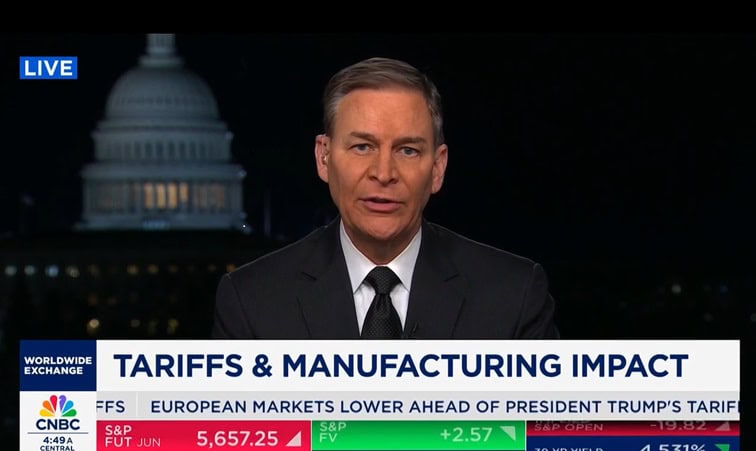
As manufacturers await the announcement of the Trump administration’s sweeping reciprocal tariffs at approximately 4:00 p.m. EDT today, NAM President and CEO Jay Timmons warned that “any scenario … is going to add cost[s] to manufacturers.”
What’s going on: Timmons, appearing on CNBC’s “Worldwide Exchange” this morning, told show anchor Frank Holland that while the world still doesn’t know what the latest tariffs will include, manufacturers are concerned—and they have good reason to be.
- Some 56% of imports to the U.S. are inputs for manufacturing, Holland said, citing NAM data. “That’s why you’re seeing this type of concern and sentiment among manufacturers,” Timmons said in response to a question about what the figure means for tariffs’ impact on the industry.
- Trade uncertainty is the top concern of the majority of manufacturers right now, Timmons said, citing the NAM’s most recent Manufacturers’ Outlook Survey. “That is up 40 percentage points over the last six months,” he told Holland. “That’s a huge jump.”
What it means: While “everybody would like more things made here in this country, because that’s good for the economy, that’s good for jobs,” new tariffs will drive “up the cost of actually making those things here in the United States,” Timmons continued.
What should be done: Manufacturers need certainty, not the nail-biting anxiety that comes from constant changes to the rules.
- “The first thing that we need to see is we need to see Congress do its job and get the tax reforms from 2017 renewed so that we have the certainty in the tax code,” said Timmons.
- Manufacturers also require relief from arduous regulatory burdens, which comes to “about $50,000 per employee per year for a small manufacturer,” Timmons told Holland, adding that the Trump administration is already working to cut those costs.
The bottom line: “There was a lot of enthusiasm when the president came in and talked about strengthening manufacturing here in the United States [and] talked about an agenda that would lower costs,” Timmons concluded.
- “But … if we don’t get the tax reforms renewed, that is an additional cost. If tariffs are imposed, that’s an additional cost. … Manufacturers … are waiting to see whether they should invest and hire. That’s not good for the economy.”
Manufacturers on the Hill Urge Action on Tax Reform Permanency
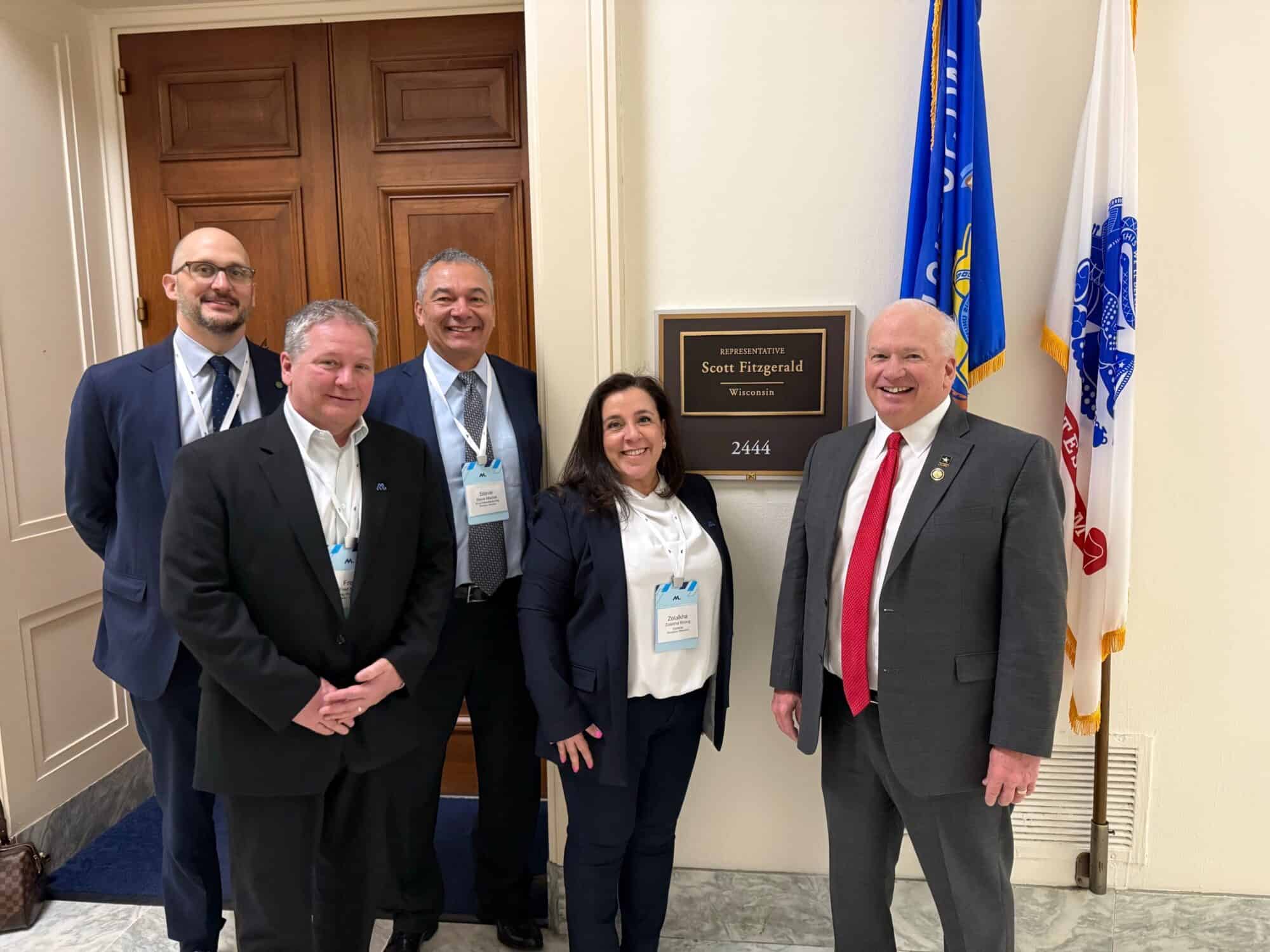
Shop floor manufacturers and NAM staff met with members of Congress yesterday and continue these meetings today on Capitol Hill to hammer home the importance of making the 2017 tax reforms permanent and getting a comprehensive reconciliation bill done now. House and Senate Republicans are working on a strategy for a tax package as part of a reconciliation bill that includes extending the 2017 Tax Cuts and Jobs Act.
- In its Morning Tax newsletter, POLITICO (subscription) reported on this week’s fly-in, naming the NAM “a powerhouse business lobby” meeting with several members of Congress as the 2025 tax bill continues to “get more intense.”
Why this is a critical moment: When the 2017 tax cuts were signed into law, “it was rocket fuel for manufacturing in America and made the U.S. economy more competitive on a global scale,” said NAM President and CEO Jay Timmons earlier this month.
- “That fuel is about to run out as key provisions have expired, and others are about to lapse. … We must ensure these historic, pro-growth manufacturing provisions are made permanent and even more competitive so manufacturers can plan, grow and succeed.”
“Exactly what the country needed”: Manufacturers traveled hundreds of miles from their shop floors to urge Congress to keep the rocket fuel for manufacturers and the American economy.
- “The Tax Cuts and Jobs Act of 2017 was huge for us,” said Tom Onsrud, CEO of the 51-year-old industrial CNC machine maker C.R. Onsrud, Inc., in Troutman, North Carolina. “It was rocket fuel. As soon as it passed, our backlog exploded. We started employing more people. We went from about 100 people to 220 people. Our floor space was maxed out. … It was exactly what the country needed.”
- One of the provisions, the immediate research and development tax credit, allowed the family-owned business to “expense equipment [costs] quickly,” Onsrud added. “That was huge for us.” That provision, however, expired in 2022.
“Vital to our company”: Stephen Bullock, president of concrete paving equipment manufacturer Power Curbers in Salisbury, North Carolina, is in Washington this week to make sure Congress knows just how important the tax reform measures have been to his small company.
- “We rely on them,” Bullock said. “We spend a lot of time and resources and money in research and development. Without [the tax provisions], it would be impossible for our company to support manufacturing. We’ve got to stay ahead of the game with new machinery, new offerings for our customers. So … anything we can do to realize those tax advantages sooner rather than later helps us very much from a cash-flow standpoint.”
- The TCJA “allowed us to expand and hire additional staff so that we [could] fund new programs, new machinery.”
“Tripled our business”: Steve Macias, co-owner of machining company Pivot Manufacturing, traveled from even farther away—Phoenix, Arizona—to make sure Congress heard what he had to say.
- “The tax reforms of 2017 … allowed us to grow our company in a way that we hadn’t [been able to] previously,” Macias told the NAM. “We were a small machine shop that did prototype and R&D work, and we’d been in business for 17 years. The tax cuts kind of gave us the kick … to take a leap and buy some production equipment, which has allowed us to virtually triple our business over the last eight years.”
- “Legislators need to understand the impact of tax reform,” Macias went on. “I’m a machine shop in Phoenix, Arizona, and there are hundreds of machine shops across the U.S., but there are also thousands upon tens of thousands of small manufacturing companies that made the same decisions we did based on those tax policies.”
Burgum Talks Taxes, Permitting and More

At an NAM-sponsored breakfast at energy conference CERAWeek in Houston on Tuesday, Interior Secretary Doug Burgum assured NAM board members that the administration has a manufacturing strategy in place, particularly regarding permitting, infrastructure development and manufacturers’ access to reliable and affordable energy.
A comprehensive strategy: In his remarks opening the event, NAM President and CEO Jay Timmons discussed the five-pillar, comprehensive manufacturing strategy that the NAM has been urging the Trump administration to implement.
- “Secretary Burgum, I just want you to know we’ve been making the case for a coordinated, comprehensive manufacturing strategy to give us the predictability and the certainty that manufacturers need to plan, to invest and to hire here in the United States, and that strategy has five pillars—goals that I know you share,” Timmons said.
- The goals are making the 2017 tax reforms even more competitive and permanent; securing regulatory certainty; expediting permitting reform to unleash American energy dominance; increasing the talent pool; and implementing a commonsense trade policy—to expand access to markets while keeping manufacturing competitive.
- Timmons warned of the dire consequences the U.S. economy and manufacturers will face if lawmakers fail to extend the 2017 tax reforms. Among them: the loss of some 6 million American jobs, according to a recent NAM–EY study.
An economic backbone: “Manufacturing, as you know, has been the backbone” of the economy, Burgum said. “President Trump ran on bringing manufacturing back to the United States. His policies are driving to do that.”
Unleashing U.S. energy: Timmons praised President Trump for his day-one lifting of the previous administration’s liquefied natural gas export permit moratorium.
- The “recent NAM LNG study found that the U.S. LNG export industry could support more than 900,000 jobs and add $216 billion to GDP by 2044,” he said.
- Said Burgum: “We are looking at everything to try to, for the first time, [have] streamlined government. … [and] it’s happening. It’s happening quickly.”
“Optimistic about the future”: The administration’s commitment to “low taxes and cutting red tape”—on which President Trump’s recently created National Energy Dominance Council is focusing—“are all things that are going to help lower your cost and create opportunities,” Burgum continued.
- “Capital is flowing to the U.S. at record levels. … I’m very optimistic about the future.”
The last word: At another event at CERAWeek, a roundtable sponsored by Natural Allies for a Clean Energy Future, Timmons summed up manufacturers’ commitments.
- “Yes, we care about developing our natural resources to power our economy, certainly through manufacturing, but it’s also about people, here in the United States and around the world,” said Timmons. “The energy that we export, that is soft power for the United States. That expands our influence. That allows us to export not only our energy, but also our values. So I think that’s very, very important for our future.”
Timmons: “Stakes Couldn’t Be Higher for Manufacturers Right Now”
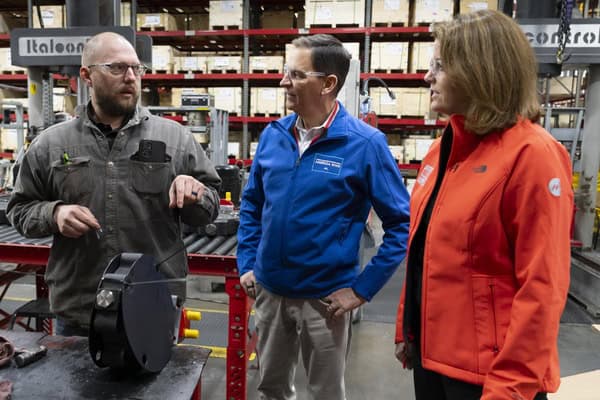
If Congress doesn’t act soon, manufacturers could face higher costs—not just due to the new tariffs on goods from China, Canada and Mexico, but from expiring tax provisions, too, NAM President and CEO Jay Timmons told the Houston Business Journal (subscription) in an interview during the first leg of the NAM’s 2025 Competing to Win Tour. The interview was published late last week.
A quick recap: Tariffs on Chinese imports went into effect last month, and tariffs on goods from Canada and Mexico began last Tuesday.
- Last Thursday, President Trump signed two executive orders adjusting the tariffs for Mexican and Canadian imports that qualify under the U.S.–Mexico–Canada Agreement, allowing them to enter the U.S. duty-free. Goods that cannot claim USMCA preferential treatment are subject to the new tariffs.
Why it’s important: “With some tariffs against Mexico, Canada and China in effect, manufacturers and consumers could be facing higher prices as the industry is heavily reliant on imports of goods the U.S. does not manufacture,” the HBJ noted.
- “Trade is very important to manufacturers,” Timmons told the publication, adding that investments in domestic supply chains and manufacturing can take years to plan and develop, something that tariff policy should take into account.
The tax angle: The 2017 Tax Cuts and Jobs Act—which President Trump first laid out in a speech to the NAM Board during the same year—contained pro-growth tax provisions that were like “rocket fuel” for the manufacturing industry. But the continuation of those provisions is at stake: some of them have expired already, harming manufacturers, and others are scheduled to sunset at the end of this year.
What should be done: The impact of tariffs on manufacturers and consumers can be mitigated and the problem of expiring tax policies solved with a commonsense strategy from the administration and Congress, Timmons told the HBJ.
- On tariffs, there needs to “be some sort of a runway to allow us to start lower and then perhaps ramp up over time to give manufacturers the ability to pivot and make those long-term investment decisions here in the United States,” he said. “If [tariffs] are implemented in a very thoughtful, common-sense and strategic way, the impact on manufacturers will be minimized.”
- As for the tax provisions set to be eliminated, congressional leaders must remain focused on keeping them. “When President Trump signed those reforms in 2017, the following year, we had the best job creation in manufacturing that we’ve had in this country in 21 years,” Timmons said.
Survey: Trade Policies Shake Up Manufacturers’ Economic Outlook
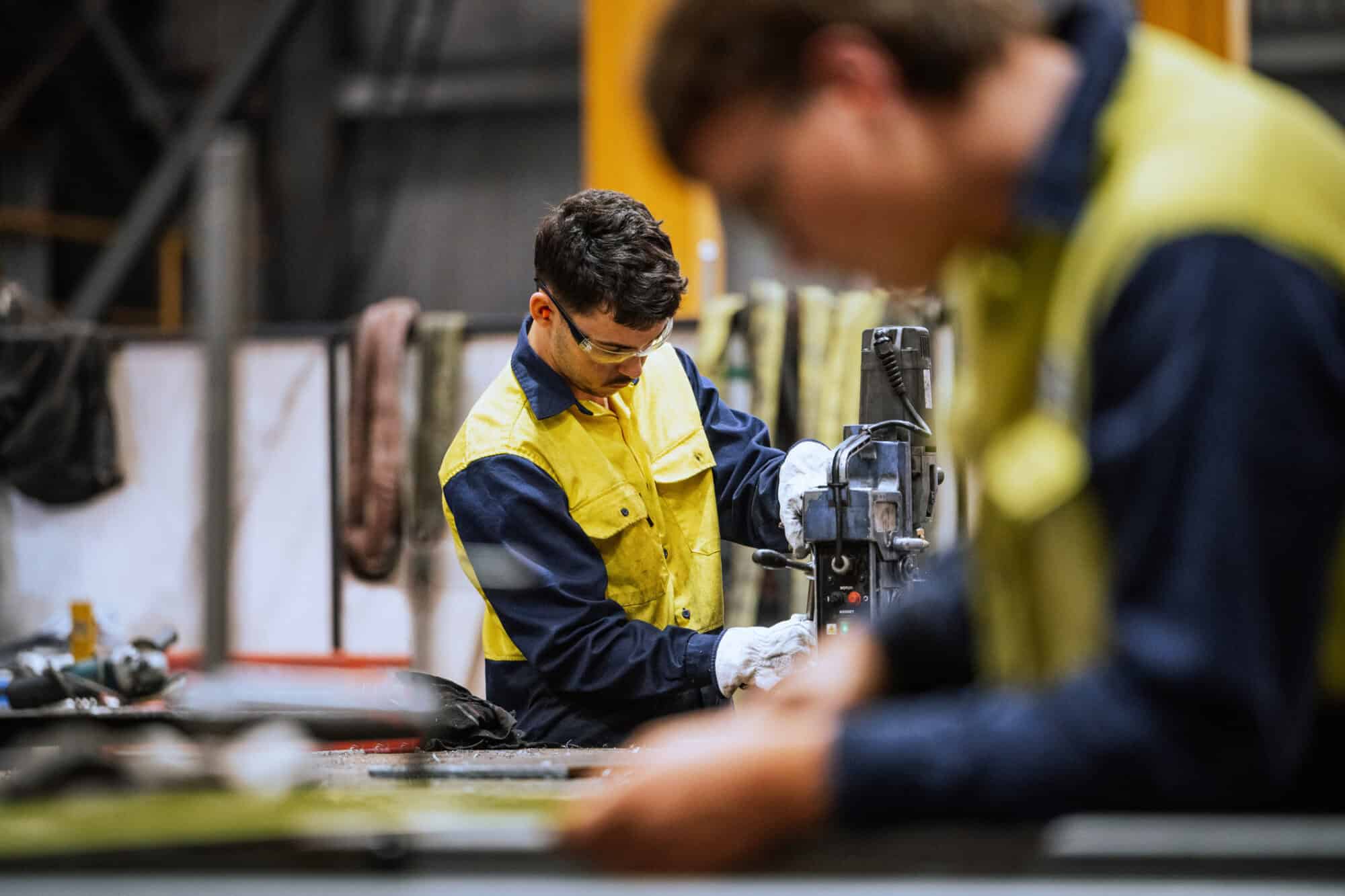
Manufacturers are increasingly worried about the future of trade and rising raw material costs, according to the Q1 2025 NAM Manufacturers’ Outlook Survey.
What’s going on: In the most recent survey, conducted from Feb. 11 to Feb. 28, trade uncertainties moved to the top of the list of manufacturers’ concerns—with 76.2% of respondents citing them as their primary worry. Increased raw material costs came in second, cited by 62.3% of those surveyed.
- In fact, manufacturers expect prices on their companies’ product lines to go up by 3.6% in the next year, an increase from 2.3% in Q4 2024 and the highest since Q3 2022, when inflation was more than 8%.
- Manufacturers also anticipate the cost of raw materials and other inputs to rise 5.5% in the next year, the highest expected rate of increase since Q2 2022, when inflation was between 8% and 9%.
- Manufacturers foresee export sales to increase just 0.1% in the next year. That’s the lowest anticipated rise since Q2 2020 at the height of the COVID-19 pandemic.
- In addition, the percentage of manufacturers with a positive outlook for their company inched down from the last quarter, to 69.7% from 70.9%.
Taxes: Manufacturers also feel strongly that their businesses need the “rocket fuel” of the tax reform extension. If Congress fails to extend pro-manufacturing provisions of the Tax Cuts and Jobs Act of 2017:
- 69.35% of respondents said they would delay capital equipment purchases;
- 45.23% would delay hiring;
- 44.72% would pause operations expansions;
- 41.71% would limit R&D investment; and
- 40.20% would curb employee wages or benefits increases.
Our take: “The pressure of increased costs, trade instability and sluggish demand is dampening the sector’s momentum, making it more difficult for manufacturers to plan, invest and hire,” NAM President and CEO Jay Timmons wrote in a social post Thursday.
- “We are calling for a comprehensive manufacturing strategy that includes a commonsense trade policy in addition to making President Trump’s 2017 tax reforms permanent and more competitive, securing regulatory certainty, expediting permitting reform to unleash American energy dominance and key manufacturing projects and increasing the talent pool.”
Lawmakers on Taxes, CHIPS, Trade and Workforce
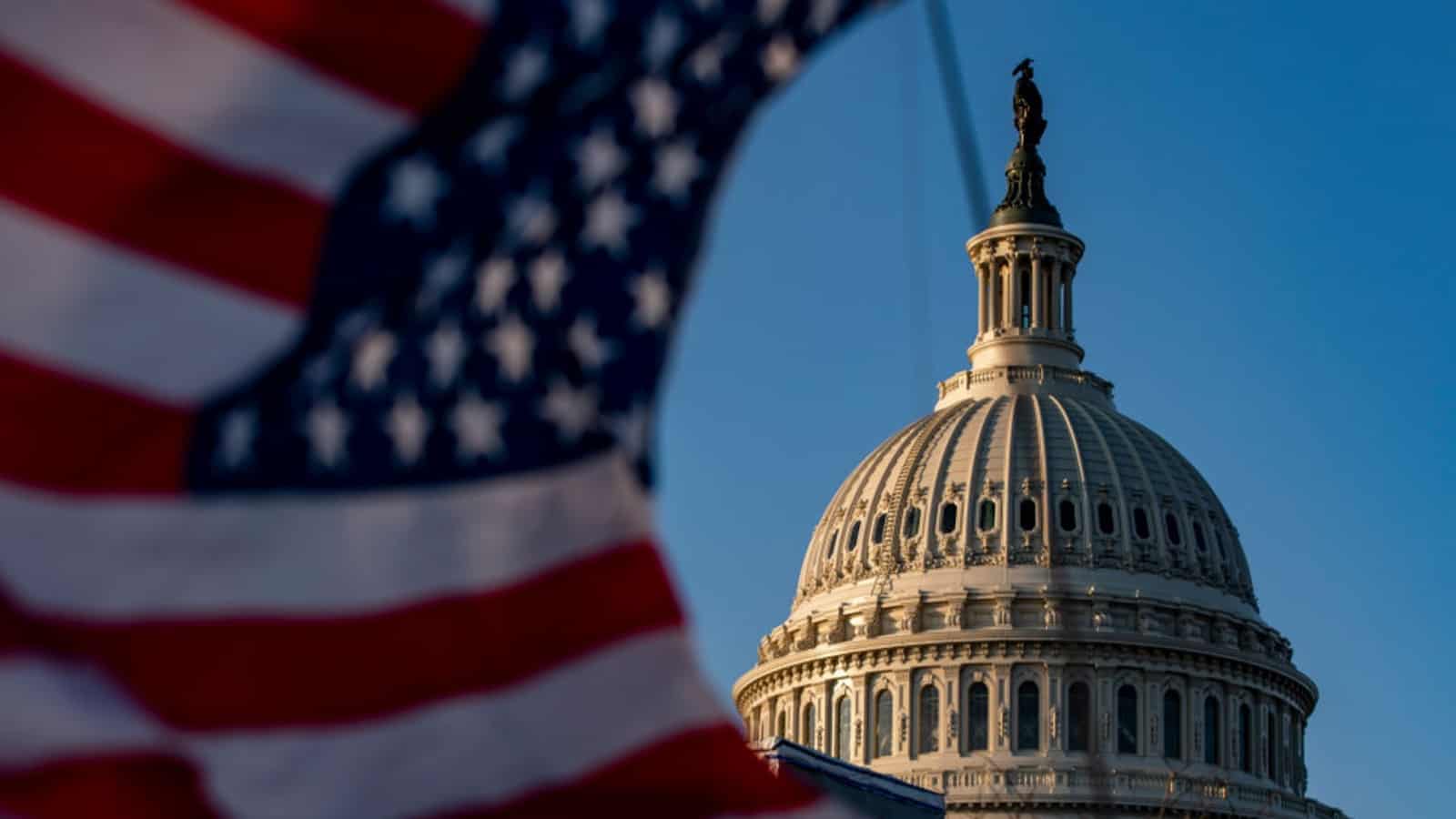
A day after President Donald Trump’s first address to Congress in his second term, the industry remains on edge amid the growing uncertainty of what’s being called a trade war by some in Washington.
What Congress is saying: We’re starting to see public comments from members of Congress on various topics in the president’s speech on Tuesday. Here’s what they’re saying.
Tax reform: House Ways and Means Committee Chairman Jason Smith (R-MO) committed yesterday to delivering a comprehensive tax bill to President Trump by Memorial Day, according to MarketWatch. Echoing NAM President and CEO Jay Timmons’ repeated calls for a swift tax deal, Chairman Smith emphasized the urgency of providing certainty to small businesses and working families, stating, “Failure is not an option.”
- “[W]e have to move this one big, beautiful bill as quickly as possible,” he said.
- In recent weeks, Timmons has leveraged the NAM’s public platform extensively—including through the NAM State of Manufacturing Address, television and radio interviews across the country, social media and op-eds in Ohio and Florida—to press Congress to act now and make the 2017 tax reforms permanent.
CHIPS: New Sen. Jon Husted (R-OH), the former lieutenant governor of the state, expressed support for the CHIPS and Science Act, emphasizing its bipartisan backing and importance of national security. “For the economic and national security of America, we need to make chips in the USA—I believe this is part of an America First agenda,” he wrote in a statement provided to The Columbus Dispatch.
- House Speaker Mike Johnson (R-LA) indicated to Punchbowl that nothing would be discussed on the CHIPS and Science Act until the president’s FY 26 budget.
- Sen. Todd Young (R-IN) said that the president’s mention of the act in his speech was “not consistent with the extensive conversations we’ve had with the administration about the many successes and future of the CHIPS program and how it helps with our shared goal of creating a robust domestic chips supply.”
Trade and workforce: “As I’ve said, tariffs are a tool in the toolbox, but they must be strategic and support American jobs—not create uncertainty that undercuts our domestic manufacturing,” Rep. Debbie Dingell (R-MI) told the Detroit Free Press. “The domestic auto industry currently relies on an integrated North American supply chain, and our trade policies need to reflect that.”
- Sen. Thom Tillis (R-NC) zeroed in on implementation of any tariffs. “If you’re talking about tariffs that are going to be inflationary, causing all kinds of retaliation and disrupting the markets, I’m almost certainly against them,” he said in an interview with CQ Roll Call. “However, if you’re talking about tariffs that are used surgically … to be used judiciously and to build the economy, then I’m all for it.”
- For Sen. Kevin Cramer (R-ND), according to The Wall Street Journal (subscription), “It comes down to how long [the tariffs] would last.” He said you “can’t simply turn on and off an inflationary switch” or flip a switch to build manufacturing facilities in the U.S., “or even harder yet, get the workforce to fill those jobs that would be created, particularly at the same time as you’re shirking immigration.”
Big picture: “Manufacturers are already planning for 2026, and they need the certainty to invest and grow now. We’re seeing bipartisan interest in these priorities, and the NAM is building consensus to achieve exactly that and have even stronger champions for manufacturers in Congress to reinforce what we need to compete and win,” said NAM Executive Vice President Erin Streeter.
President Trump Cements Tariffs as a Fixture of Trade Policy
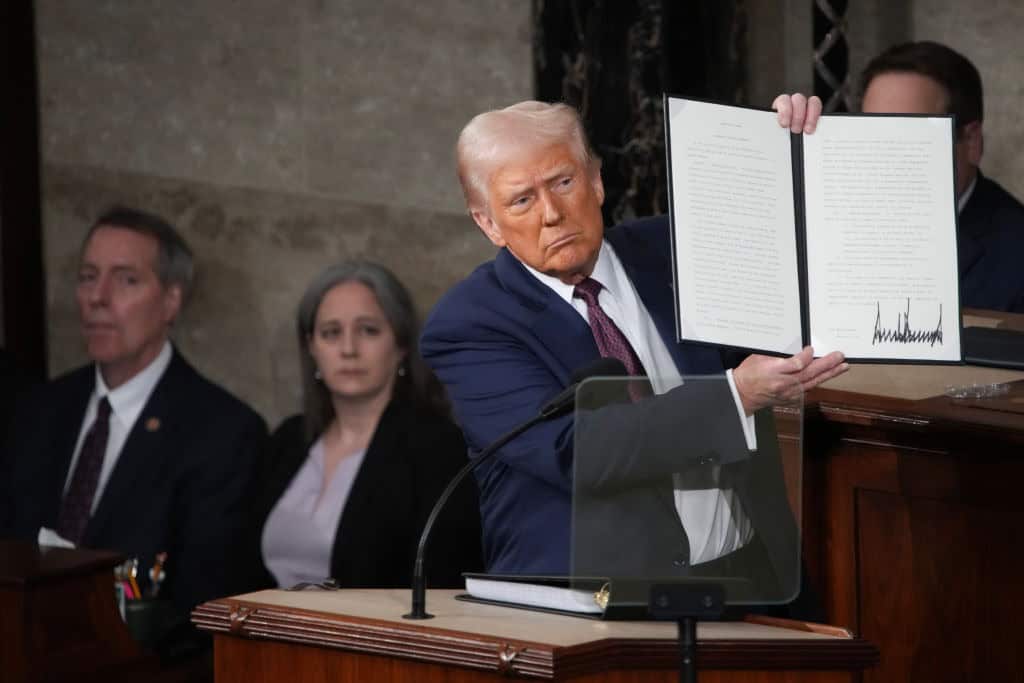
In his first address to Congress in his second term, President Trump made it clear that tariffs are not just a temporary tool, but a fixture of his administration’s trade policy. The president discussed his vision for an “America First” strategy, which includes the tariffs that went into effect Tuesday and last month.
In his words: “Deals are being made,” he said. “That’s a combination of the election win and tariffs. It’s a beautiful word, isn’t it?”
- “If you don’t make your product in America … you will pay a tariff and, in some cases, a rather large one. Other countries have used tariffs against us for decades, and now it’s our turn to start using them against those other countries.”
- “On average [according to the president], the European Union, China, Brazil, India, Mexico and Canada … and countless other nations charge us tremendously higher tariffs than we charge them. It’s very unfair.”
- “[On April 2,] reciprocal tariffs kick in, and whatever they tariff us, other countries, we will tariff them…If they do nonmonetary tariffs to keep us out of their market, then we will do nonmonetary barriers to keep them out of our market.”
On Canada and Mexico: “[W]e have very large deficits with both of them. … We pay subsidies to Canada and to Mexico of hundreds of billions of dollars. And the United States will not be doing that any longer. We are not going to do it any longer.”
- “Tariffs are about making America rich again and making America great again, and it is happening, and it will happen rather quickly. There will be a little disturbance, but we are OK with that.”
The NAM’s take: Ahead of the speech, NAM President and CEO Jay Timmons pointed out in a statement that manufacturers—especially those with thin margins—are already feeling the pressure from new tariffs. “The stakes couldn’t be higher for manufacturers right now,” he said. The NAM highlighted some examples after the tariffs went into effect yesterday from both small and large manufacturers:
- A power-engineering manufacturer faces $25 million in additional costs from the Mexico tariffs alone, impacting the ability to supply U.S. utilities and industrial customers.
- A major consumer goods manufacturer is looking at $231 million new costs from tariffs from Mexico and Canada.
- A small copper manufacturer was forced to turn back 388,000 pounds of copper at the Canadian border when tariffs took effect, with future imports costing an extra $50,000 per truckload.
Comprehensive manufacturing strategy: “To mitigate the adverse effects of today’s tariffs,” Timmons said, “President Trump and Congress [need] to implement a comprehensive manufacturing strategy that would create predictability and certainty to invest, plan and hire.”
- That strategy should include making President Trump’s 2017 tax reforms permanent and more competitive, securing regulatory certainty, expediting permitting reform to unleash American energy dominance and key manufacturing projects, increasing the talent pool and implementing a commonsense trade policy, Timmons added.
- In recent weeks, including with the NAM State of Manufacturing Address, Timmons has been raising the alarm on the need to move now on preserving and extending the 2017 tax reforms in the face of the uncertainty and price pressures.
The bottom line: “Building things in America only works if we can sell them around the world,” said Timmons. He added this morning: “That’s why we’re urging President Trump and Congress to provide greater predictability with a phase-in period for manufacturers to adjust to new trade realities, while also establishing clear exemptions for critical inputs, enabling reciprocity in manufacturing trade.”
- “President Trump can make American manufacturing greater than ever before by negotiating a ‘zero for zero’ tariffs manufacturing trade deal with our major trading partners,” Timmons said.
Developing: This morning on Bloomberg TV, Commerce Secretary Howard Lutnick hinted publicly that he has heard the NAM and the industry’s urging for relief from tariffs on Canadian and Mexican imports for products that comply with the U.S.–Mexico–Canada Agreement—a signature achievement of President Trump’s first term.
President Trump Doubles Down on Tax Reform
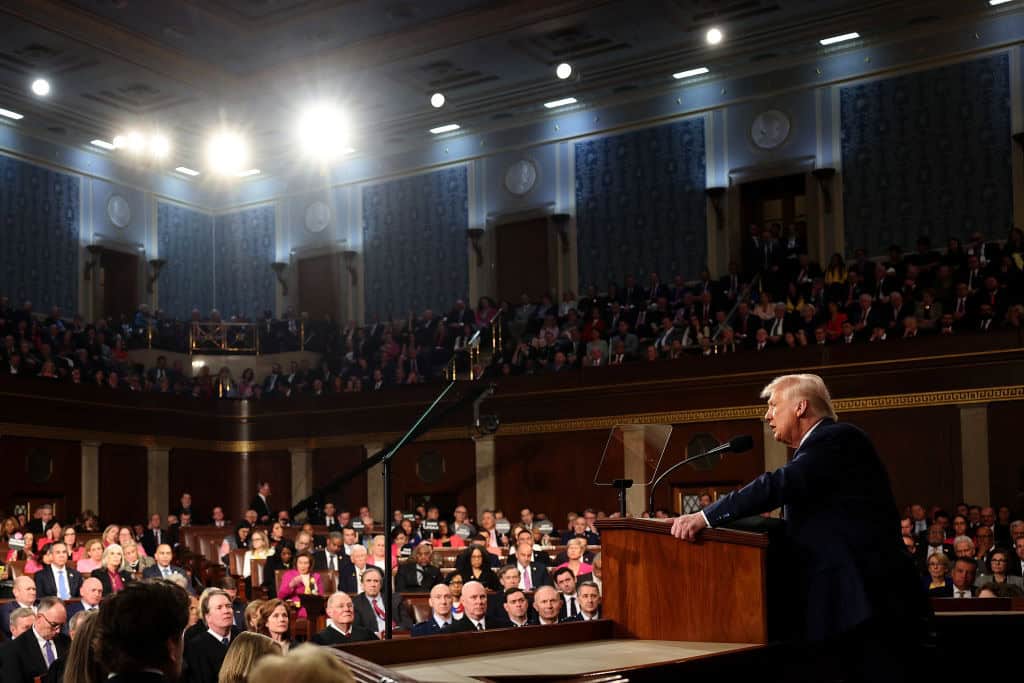
“[T]he next phase of our plan to deliver the greatest economy is for this Congress to pass tax cuts for everybody,” President Trump said last night, reiterating the importance of this key manufacturing policy priority. “They’re in there. They’re waiting for you to vote,” he said.
The urgency: Even before price pressures from tariffs, the NAM’s study with EY showed that failing to act now could cost the U.S. 6 million jobs—including more than 1.1 million in manufacturing.
- In addition, approximately $540 billion in employee wages will be lost, and U.S. GDP will be reduced by $1.1 trillion.
The NAM says: “When President Trump signed these tax cuts into law, it was rocket fuel for manufacturing in America and made the U.S. economy more competitive on a global scale,” said Timmons last night. “That fuel is about to run out as key provisions have expired, and others are about to lapse. …We must ensure these historic, pro-growth manufacturing provisions are made permanent and even more competitive so manufacturers can plan, grow and succeed.”
- “Manufacturers need a deal now as they make decisions for investments in 2026 and beyond,” NAM Executive Vice President Erin Streeter said. “Every day we delay costs investments, jobs and opportunity.”
Making the case: Since igniting the sprint toward a tax deal with House Speaker Mike Johnson (R-LA), House Majority Leader Steve Scalise (R-LA), House Ways and Means Committee Chairman Jason Smith (R-MO) and Senate Finance Committee Chairman Mike Crapo (R-ID) at the Capitol in January, the NAM has kept the pressure on lawmakers.
- Yesterday during the president’s address to Congress, the NAM leveraged a new tax ad, “When Manufacturing Wins, America Wins,” to amplify its message even further.
Manufacturers to Trump and Congress: Act Now on Comprehensive, Commonsense Manufacturing Strategy as Tariffs Hit Manufacturing Industry
National Association of Manufacturers President and CEO Jay Timmons released the following statement ahead of President Donald Trump’s address to a joint session of Congress:
“The stakes couldn’t be higher for manufacturers right now. Many manufacturers are operating on thin margins, and the tariffs imposed today will further strain their resources. For example:
- A large manufacturer in the power-engineering sector that imports more than $100 million every year in components and products from Mexico now faces increasing costs of $25 million due to the tariffs. As a major supplier to the U.S. utility and industrial market, this will directly impact the ability for domestic utilities and industrial customers to maintain a safe, efficient and secure power grid.
- Another large consumer goods manufacturer indicated the tariffs on Mexico will cost their company $200 million, and the Canadian retaliatory tariffs will add another $31 million—totaling $231 million, or $1.15 million per day.
- A small copper manufacturer had nine truckloads of copper rod sitting at the Canadian border waiting to go through Customs when the tariffs went into effect, leading to 388,000 pounds of copper goods being returned to the supplier. If the tariffs remain in effect, bringing copper—a critical manufacturing input—into the U.S. would cost the manufacturer nearly $50,000 per truckload going forward.
“To mitigate the adverse effects of today’s tariffs, manufacturers call on President Trump and Congress to implement a comprehensive manufacturing strategy that would create predictability and certainty to invest, plan and hire in America. This strategy includes the following actions:
- Make President Trump’s 2017 tax reforms permanent and more competitive now. When President Trump signed these tax cuts into law, it was rocket fuel for manufacturing in America and made the U.S. economy more competitive on a global scale. That fuel is about to run out as key provisions have expired, and others are about to lapse. If Congress fails to act, it will cost America 6 million jobs, including more than 1.1 million manufacturing jobs. We must ensure these historic, pro-growth manufacturing provisions are made permanent and even more competitive so manufacturers can plan, grow and succeed.
- Restore regulatory certainty. Manufacturers are spending $350 billion each year just to comply with regulations—money that could be spent on expanding factories and production lines, hiring new workers or raising wages. President Trump has taken action already to streamline burdensome regulations starting with lifting the liquefied natural gas export ban, but we need to move faster to deliver on our industry’s potential.
- Expedite permitting reform to unleash American energy. President Trump is already ending the war on America’s energy producers, but there is more work to do. America should be the undisputed leader in energy production and innovation, but we will not reach our full potential without permitting reform. We are seeing opportunities for energy dominance fade in the face of a permitting process that takes 80% longer than other major, developed nations.
- Strengthen the manufacturing workforce. Over the past year, we have averaged 500,000 open manufacturing jobs in America—well-paying, life-changing careers. Manufacturers are struggling to fill critical jobs. We need a real workforce strategy that ensures we have the talent to grow, compete and lead.
- Implement commonsense trade policies that open global markets fairly and effectively. Building things in America only works if we can sell them around the world. That’s why we’re urging President Trump and Congress to provide greater predictability and a clear runway for manufacturers to adjust to new trade realities, while also making way for exemptions for critical inputs, enabling reciprocity in manufacturing trade.
“Manufacturers are investing in America in record numbers, and President Trump is focused on strengthening manufacturing in the United States to grow our nation’s economy. We look forward to working with President Trump as he works to advance policies that will help manufacturers thrive and prosper because when manufacturing wins, America wins.”
-NAM-
The National Association of Manufacturers is the largest manufacturing association in the United States, representing small and large manufacturers in every industrial sector and in all 50 states. Manufacturing employs nearly 13 million men and women, contributes $2.93 trillion to the U.S. economy annually and accounts for 53% of private-sector research and development. The NAM is the powerful voice of the manufacturing community and the leading advocate for a policy agenda that helps manufacturers compete in the global economy and create jobs across the United States. For more information about the NAM or to follow us on Twitter and Facebook, please visit www.nam.org.
Lilly: 2017 Tax Reform Makes Four New U.S. Manufacturing Sites Possible
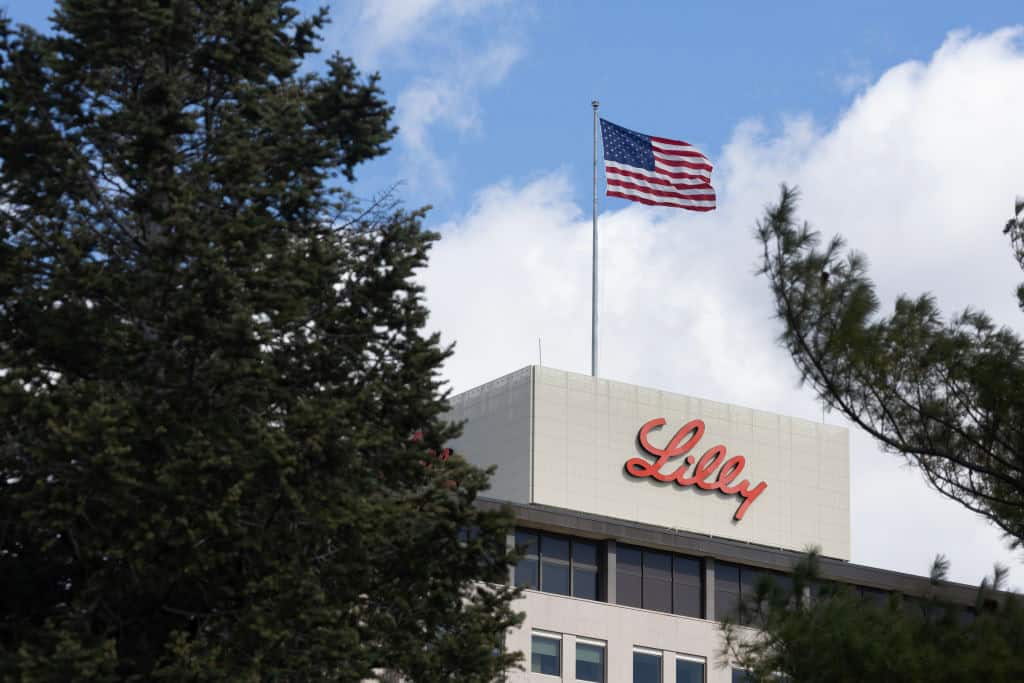
Biopharmaceutical company Lilly will build four new manufacturing sites across the U.S., it announced Wednesday at a Washington, D.C., press conference. The event was attended by NAM President and CEO Jay Timmons, Commerce Secretary Howard Lutnick, National Economic Council Director Kevin Hassett, Indiana Sen. Todd Young and Lilly Executive Vice President and President of Manufacturing Operations (and NAM board member) Edgardo Hernandez, among others.
What’s going on: Three of the planned manufacturing campuses will focus on producing active pharmaceutical ingredients, reshoring “critical capabilities of small molecule synthesis and further strengthening Lilly’s supply chain,” the company said in a press release. The fourth site will “extend [Lilly’s] global parenteral manufacturing network for future injectable therapies.”
- The investment in the four sites will bring Lilly’s total U.S. capital expansion commitment to more than $50 billion since 2020.
- Lilly—which in recent years has made $23 billion worth of investments in new research and manufacturing sites in the American South and Midwest—is in talks with several states about building the facilities there, but it is accepting additional expressions of interest from states until March 12.
The anticipated benefit: The four sites are expected to create more than 3,000 permanent skilled jobs and more than 10,000 construction jobs during building, according to the company.
The tax reform factor: Lilly’s planned expansion reflects “decades of research and dedication,” Timmons said at the event announcing the investment. It “is the culmination of sustained planning made possible by the certainty created through smart public policy—particularly the 2017 tax reforms that President Trump … championed back at a meeting of the NAM Board of Directors in September 2017.”
- Many of those manufacturing-critical reforms have been allowed to expire, however, and others will expire at the end of the year—unless Congress acts, and soon, Lilly Chair and CEO David Ricks said.
- “The Tax Cuts and Jobs Act legislation passed in 2017 during President Trump’s first term in office has been foundational to Lilly’s domestic manufacturing investments, and it is essential that these policies are extended this year.”
Keep the momentum going: Lilly’s announcement shows other manufacturers “exactly why [they] have reason for optimism and confidence,” Timmons went on. “But to keep this momentum going—to encourage more groundbreaking investments, more job creation and more life-changing innovation—a comprehensive manufacturing strategy must become the reality … because when manufacturing wins, America wins.”
